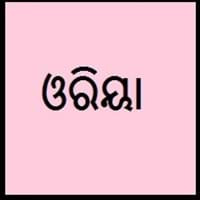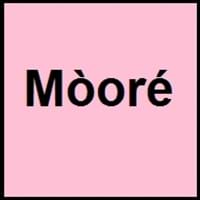Oriya and Mossi
Countries
India
Burkina Faso
National Language
India
Benin, Burkina Faso, Ghana, Ivory coast, Mali, Togo
Second Language
Not spoken in any of the countries
Not spoken in any of the countries
Speaking Continents
Asia
Asia
Minority Language
Not spoken in any of the countries
Not spoken in any of the countries
Regulated By
Not Available
Not Available
Interesting Facts
- The earliest literature in Oriya was traced in 7th to 9th centuries.
- Since Odia is having a long literary history and has not borrowed largely from other languages, it is the 6th classical language in India.
- Mossi languages use pitch to distinguish meanings.
- Mossi is the 2nd largest ethnic group in Ivory Coast.
Similar To
Bengali and Assamese
Dagbani Language
Derived From
Sanskrit Language
Not Available
Alphabets in
Oriya-Alphabets.jpg#200
Mossi-Alphabets.jpg#200
Scripts
Bengali, Odia alphabet (Brahmic)
Latin
Writing Direction
Left-To-Right, Horizontal
Not Available
Hello
ନମସ୍କାର (namascara)
Kia ora
Thank You
ଧନ୍ୟବାଦ୍ (dhanyabaad)
Laafi bala
How Are You?
କେମିତି ଅତ୍ଚନ୍ଥି? (kemiti achanti?)
Laafi beme ?
Good Night
ସୁଭରାତ୍ର (shubharaatra)
Ne y yungo
Good Evening
ସୁଭସନ୍ଧ୍ୟା (subha sandhya)
ne y zabre
Good Afternoon
ସୁଭ ଖରା ବେଳ (shubha kharaa bela)
Kia ora
Good Morning
ସୁପ୍ରଭାତ (suprabhaata)
Ne y yibeogo
Please
Not Available
gafare
Sorry
ମୁଁ ଦୁଃଖିତ (mū duḥkhita)
gafare
Bye
ସୁବିଦାୟ (shubidaaya)
Wend na kon-d nindaare
I Love You
ମୁଁ ତୁମକୁ ଭଲ ପାଏ (mu tumoku bhala paye)
Kei te aroha au ki a koe
Excuse Me
କ୍ଷମା କରିବେ (kyamā karibe)
Y gafare
Dialect 1
Baleswari
Ouapadoupou
Where They Speak
India
Burkina Faso
Dialect 2
Ganjami
Saremde
Where They Speak
India
Burkina Faso
Where They Speak
India
Burkina Faso
How Many People Speak
Not Available
Native Name
ଓଡ଼ିଆ (ōṛiyā)
Mosse
Alternative Names
Odisha, Odri, Odrum, Oliya, Uriya, Utkali, Vadiya, Yudhia
Not Available
German Name
Oriya-Sprache
Mossi-Sprache
Pronunciation
[ˈoɽia]
Not Available
Origin
3 BC
Not available
Language Family
Indo-European Family
Niger-Congo Family
Subgroup
Indo-Iranian
Western Sudanic
Branch
Indic
Gur (Voltaic)
Early Forms
No early forms
No early forms
Standard Forms
Standard Odia
Mossi
Language Position
Not Available
Signed Forms
Indian Signing System
Not Available
Scope
Individual, Macrolanguage
Individual
ISO 639 1
or
No data Available
ISO 639 6
Not Available
Not Available
Glottocode
macr1269
moss1236
Linguasphere
No data available
No data Available
Language Type
Living
Living
Language Linguistic Typology
Subject-Object-Verb
Not Available
Language Morphological Typology
Not Available
Not Available
All Oriya and Mossi Dialects
Most languages have dialects where each dialect differ from other dialect with respect to grammar and vocabulary. Here you will get to know all Oriya and Mossi dialects. Various dialects of Oriya and Mossi language differ in their pronunciations and words. Dialects of Oriya are spoken in different Oriya Speaking Countries whereas Mossi Dialects are spoken in different Mossi speaking countries. Also the number of people speaking Oriya vs Mossi Dialects varies from few thousands to many millions. Some of the Oriya dialects include: Baleswari, Ganjami. Mossi dialects include: Ouapadoupou , Saremde. Also learn about dialects in South American Languages and North American Languages.
Oriya and Mossi Speaking population
Oriya and Mossi speaking population is one of the factors based on which Oriya and Mossi languages can be compared. The total count of Oriya and Mossi Speaking population in percentage is also given. The percentage of people speaking Oriya language is 0.50 % whereas the percentage of people speaking Mossi language is 0.11 %. When we compare the speaking population of any two languages we get to know which of two languages is more popular. Find more details about how many people speak Oriya and Mossi on Oriya vs Mossi where you will get native speakers, speaking population in percentage and native names.
Oriya and Mossi Language Codes
Oriya and Mossi language codes are used in those applications where using language names are tedious. Oriya and Mossi Language Codes include all the international language codes, glottocodes and linguasphere.





